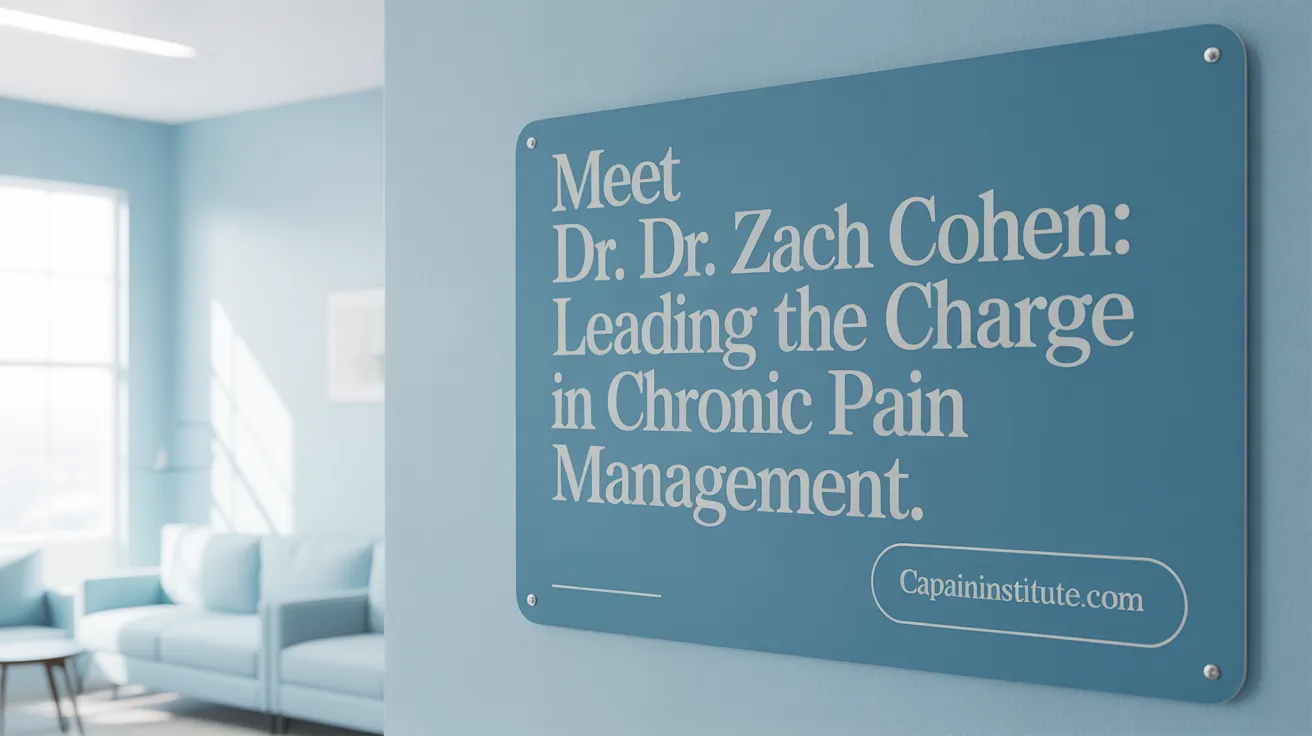Understanding the Role of Specialist Care in Chronic Pain Management
Overview of Specialist Care in Chronic Pain
Chronic pain management requires evaluation and treatment by devoted specialists trained in pain physiology, diagnosis, and intervention. Pain management specialists possess advanced skills to address complex pain types originating from diverse causes such as surgery, injury, nerve damage, and metabolic disorders. Their expertise often includes administering specialized procedures such as nerve blocks, spinal injections, and the use of neuromodulation devices.
These specialists perform thorough initial assessments, including detailed histories, physical exams, and diagnostic tests to develop tailored treatment plans. This comprehensive approach ensures that each patient receives care appropriate to the unique nature of their condition.
Importance of Expertise and Multidisciplinary Approaches
Expertise, validated by board certification and fellowship training, is critical for effective management of chronic pain conditions. Board certifications from recognized medical boards in anesthesiology, neurology, psychiatry, or physical medicine highlight proficiency in pain care.
Given the complexity of chronic pain, successful treatment largely depends on multidisciplinary collaboration. Effective pain management programs involve coordinated input from physicians, psychologists, physiotherapists, and other healthcare providers. This team-based approach addresses not only physical symptoms but also emotional and social dimensions of pain.
Multidisciplinary care enables the incorporation of therapies such as cognitive behavioral therapy, physical therapy, medication management, and interventional procedures. This holistic framework enhances patient functioning and quality of life, even when complete pain relief is unattainable.
In summary, specialist care combining deep expertise with coordinated multidisciplinary methods offers a robust foundation for managing chronic pain effectively and improving patient outcomes.
Leadership and Expertise at the California Pain Institute

Who leads the medical team at the California Pain Institute?
The medical team at the California Pain Institute is led by Dr. Zach Cohen, a double Board Certified physician with fellowship training in Chronic Pain Medicine from the University of California San Diego. His extensive expertise in diagnosing and managing chronic pain conditions forms the foundation of the institute's approach to patient care. Dr. Cohen is supported by a multidisciplinary team that includes pain medicine specialists, physical therapists, psychologists, and nursing staff, all working collaboratively to deliver individualized treatment plans tailored to each patient's unique pain experience.
What is the composition of the medical team and multidisciplinary care?
The institute's medical team consists of board-certified pain physicians, rehabilitation specialists, and ancillary healthcare providers who emphasize comprehensive, interdisciplinary care. This collaborative model integrates advanced diagnostic methods, interventional procedures, regenerative therapies, psychological support, and physical rehabilitation to address pain from multiple angles. Their coordinated efforts ensure patients benefit from both medical innovations and holistic support, facilitating improved functionality and quality of life. This approach reflects best practices in multidisciplinary pain management and the multidisciplinary pain management approach.
How does expert leadership impact patient outcomes?
Expert leadership at the California Pain Institute shapes clinical protocols that prioritize cutting-edge, evidence-based therapies and a patient-focused care philosophy. The director's hands-on involvement in clinical decision-making promotes innovation such as neuromodulation devices for pain, spinal cord stimulation, and non-invasive technologies, while fostering a culture of compassionate care. This leadership approach has been linked with enhanced pain relief, greater patient satisfaction, and improved long-term management of complex chronic pain conditions prevalent in the Los Angeles region.
Comprehensive Diagnosis: The Foundation of Effective Pain Management

What diagnostic methods are used at the California Pain Institute to identify chronic pain causes?
At the California Pain Institute, an accurate diagnosis is essential to tailor effective chronic pain treatment. Their diagnostic approach begins with a thorough evaluation of the patient’s medical history and a detailed physical exam. This process helps understand the pain’s origins and its impact on daily life.
Advanced imaging techniques such as MRI, X-rays, ultrasound, and CT scans play a critical role in revealing structural issues like joint degeneration, spinal abnormalities, or nerve compression. Fluoroscopy-guided procedures enable precise targeting during diagnostic injections, enhancing both identification and temporary relief of specific pain generators.
The clinic employs specialized diagnostic pain procedures including nerve blocks, epidural and joint injections, and discography. These minimally invasive techniques help pinpoint problematic nerves or tissues contributing to chronic pain.
For complex pain syndromes, assessments like Quantitative Sensory Testing (QST) and the Central Sensitization Inventory (CSI) are used to evaluate nerve function and central sensitization phenomena, which are key in many chronic pain conditions.
Importantly, the California Pain Institute embraces the biopsychosocial model, acknowledging that psychological and social factors contribute to pain perception. Patients are encouraged to maintain pain journals and detailed symptom logs to provide comprehensive insight. Cutting-edge diagnostic tools, such as neurofeedback and genetic testing, complement traditional assessments to personalize diagnosis and guide targeted therapies.
This comprehensive diagnostic process ensures that treatment at the institute is specific, effective, and holistic, addressing pain in its physiological, psychological, and social dimensions.
Personalized Treatment Planning for Optimal Patient Outcomes

How does the California Pain Institute develop personalized treatment plans for chronic pain patients?
The California Pain Institute adopts a patient-centered approach to crafting individualized treatment plans tailored to each chronic pain sufferer’s unique needs. The process begins with a thorough assessment that reviews diagnostic results and patient history to understand the full landscape of their pain condition.
Collaboration between clinicians and patients is vital, ensuring treatment goals are specific, measurable, achievable, relevant, and time-bound (SMART). This goal-setting framework helps patients stay engaged and motivated.
The Institute employs a multimodal strategy combining several therapies to maximize outcomes. This includes medication management, physical therapy focused on graded exercise and flexibility training, and psychological support like Cognitive-Behavioral Therapy and mindfulness techniques. When necessary, advanced interventional treatments such as nerve blocks, radiofrequency ablation, and spinal cord stimulation are incorporated.
Lifestyle adjustments and complementary therapies also play an important role. Regular follow-ups allow for close monitoring and modification of plans, especially for patients receiving opioids, emphasizing safety and efficacy.
This comprehensive, multidisciplinary approach ensures not only pain reduction but also improved physical function and enhanced quality of life, distinctly addressing the complex challenges chronic pain poses to Los Angeles patients.
Innovative Interventional Techniques Enhancing Pain Relief

What interventional pain management treatments are available at the California Pain Institute?
The California Pain Institute offers a broad spectrum of interventional treatments designed to address complex chronic pain conditions effectively. Their services include nerve blocks and spinal injections, which help reduce localized inflammation and nerve irritation. For more advanced cases, spinal cord stimulation and intrathecal pump implantation are available, delivering targeted pain relief by modulating nerve activity.
Additional minimally invasive procedures such as radiofrequency ablation are used to disrupt pain signals without extensive surgery. These techniques facilitate quicker recovery times and reduced procedural risks for patients.
Use of neuromodulation and regenerative medicine
Neuromodulation is a cornerstone of modern pain management at the institute. Treatments such as dorsal root ganglion (DRG) stimulation and peripheral nerve stimulation provide precise control of nerve function to alleviate chronic pain syndromes, including complex regional pain syndrome (CRPS).
The clinic also integrates regenerative medicine approaches like platelet-rich plasma (PRP) injections, which promote tissue healing and symptom improvement in musculoskeletal disorders. Such innovative therapies are complemented by ketamine infusions and cutting-edge interventions, reflecting the clinic's commitment to multidisciplinary, technologically advanced care.
Minimally invasive procedures and patient benefits
Minimally invasive procedures at the California Pain Institute offer significant benefits, including decreased pain during recovery, reduced hospitalization time, and faster return to daily activities. These treatments are tailored to individual patient conditions to maximize effectiveness while minimizing side effects.
By combining interventional procedures with comprehensive evaluation and rehabilitation programs, the institute enhances patients' quality of life and functional outcomes. This patient-centered approach ensures that therapeutic choices align with personal health goals, promoting long-term pain management success.
Addressing the Psychological Dimensions of Chronic Pain

Psychological impacts of chronic pain
Chronic pain often leads to significant psychological distress, affecting patients' emotional well-being, mental health, and overall quality of life. Individuals dealing with persistent pain commonly experience anxiety, depression, and feelings of helplessness, which can further exacerbate their pain perception and limit day-to-day functioning. Understanding and addressing these psychological effects is crucial for effective chronic pain management.
Therapeutic approaches such as CBT and ACT
The California Pain Institute places strong emphasis on psychological care by offering evidence-based therapies like cognitive-behavioral therapy (CBT) and acceptance and commitment therapy (ACT). These therapies empower patients to develop healthier thought patterns and coping strategies, helping to break the cycle of pain and emotional distress. CBT focuses on modifying unhelpful beliefs and behaviors related to pain, while ACT encourages acceptance of pain and commitment to value-driven actions, improving emotional flexibility.
Integration of non-drug approaches and mental health support
Beyond traditional counseling, the institute integrates non-drug methods such as hypnosis, meditation, yoga, and biofeedback. These approaches promote relaxation, enhance mental resilience, and aid in reducing stress, which can diminish pain intensity. Multidisciplinary pain management programs lasting several weeks combine physical therapy, psychological support, and education to leverage neuroplasticity—the brain's ability to rewire itself—thus reducing fear and improving function.
By combining psychological treatments with physical and educational interventions, the California Pain Institute supports patients holistically, helping them manage the emotional and cognitive challenges of chronic pain while improving their overall quality of life with pain.
Multidisciplinary Collaboration: Key to Enhanced Success Rates
Why Are Multidisciplinary Teams Important in Pain Management?
Effective management of chronic pain extends beyond medication or single treatments. It requires a multidisciplinary pain management approach, where a diverse team of healthcare professionals collaborates to address the complex nature of pain.
What Specialties Are Involved and How Do They Coordinate?
Pain management typically involves medical doctors such as anesthesiologists and pain specialists, along with psychologists, physiotherapists, and sometimes occupational therapists. Coordination among these specialties ensures that treatment covers physical rehabilitation, emotional support, and medical interventions, creating a comprehensive care plan tailored to the patient's needs. This approach reflects best practices seen in leading centers such as the UCLA Comprehensive Pain Centers.
In What Ways Does This Collaboration Improve Patient Outcomes?
Multidisciplinary collaboration leads to improvements in physical functioning, emotional well-being, and social participation, even when pain persists. Programs incorporating this approach, such as pain management programmes (PMPs) and pain rehabilitation, emphasize self-management skills, boost independence, and enhance overall quality of life.
Studies have shown that teamwork across specialties yields sustained improvements lasting years, helping patients manage pain more effectively and reduce reliance on medications. This collaborative care is especially vital for complex or chronic conditions prevalent in areas like Pain Management Los Angeles, where diverse and challenging pain cases require comprehensive treatment strategies.
Specialists’ Advanced Training and Certification Elevate Care Quality
Role of board certification and fellowship training
Pain management specialists undergo rigorous education, including fellowship training and board certification in fields such as anesthesiology, physical medicine, neurology, or psychiatry. This advanced training ensures they possess a deep understanding of pain physiology expertise and the skills required for specialized evaluations and interventional procedures. Choosing a board-certified specialist guarantees care from a physician with proven expertise and up-to-date knowledge.
Specialized knowledge in pain physiology and intervention
Experts in pain medicine thoroughly grasp neurophysiological mechanisms like central sensitization in pain and altered nociceptive processing, enabling precise diagnosis and targeted treatment. Their skills include the use of advanced diagnostics and image-guided interventions, such as nerve blocks and spinal injections, providing highly effective, minimally invasive options. This knowledge supports multidisciplinary pain management involving physical therapy, psychological support, and regenerative therapies.
Impact of expert qualifications on treatment efficacy
Clinics like the California Pain Institute stand out by employing double board-certified physicians who combine fellowship training with extensive clinical experience. This expertise translates into superior treatment outcomes through personalized care plans that utilize innovative treatments such as spinal cord stimulation, PRP injections for pain, and ketamine therapy for chronic pain. Their multidisciplinary approach and adherence to evidence-based guidelines enhance safety and efficacy, improving quality of life for patients managing complex chronic pain care in Los Angeles and beyond.
Chronic Pain Conditions Managed and the Impact on Patient Lives
What types of chronic pain conditions does the California Pain Institute diagnose and manage?
The California Pain Institute expertly diagnoses and manages a broad spectrum of chronic pain conditions seen frequently in Los Angeles, such as neuropathic pain, arthritis, lower back and neck pain, fibromyalgia, headaches, complex regional pain syndrome (CRPS), and post-surgical pain. Their highly trained multidisciplinary team applies a personalized treatment approach, combining medications, psychological therapy, physical rehabilitation, and advanced interventional procedures to address each patient's specific pain profile.
Variety of chronic pain conditions handled
Patients at the institute benefit from tailored therapies designed to manage complex and multifactorial pain sources. Treatments include nerve blocks, radiofrequency ablation, ketamine infusions, spinal cord stimulation, and intrathecal drug delivery. These techniques specifically target both nerve-related and musculoskeletal pain, enabling symptom relief even in challenging chronic cases as part of innovative pain therapies.
Effectiveness of treatment in improving function and reducing pain
Evidence from chronic pain management programs at the institute shows significant improvement in patients' physical function and emotional wellbeing. The multidisciplinary pain management approach enhances coping skills and promotes self-management, resulting in sustained pain reduction and better quality of life. Many patients report increased independence, reduced reliance on opioids, and meaningful gains in daily activities through this comprehensive care model.
Tailored strategies for complex and multifactorial pain
Recognizing the multifaceted nature of chronic pain, the institute integrates psychological support and lifestyle counseling into treatment plans. This holistic approach addresses not only physical symptoms but also the emotional and social impacts of chronic pain, ensuring comprehensive care that supports long-term recovery and improved patient outcomes in the diverse populations served around Los Angeles with multidisciplinary pain care in Los Angeles.
Specialist Care as a Catalyst for Success in Chronic Pain Management
Specialist-Led, Multidisciplinary Care Elevates Chronic Pain Outcomes
Specialist care forms the cornerstone of effective chronic pain management, combining expert evaluation, diagnosis, and tailored treatment strategies. Pain management specialists possess advanced skills in understanding pain physiology and utilize comprehensive assessments to guide treatment decisions. Collaborating closely with psychologists, physiotherapists, and other healthcare providers ensures a multidisciplinary approach that addresses physical, emotional, and social factors affecting patients.
Cutting-Edge Diagnostics and Treatments Enhance Patient Recovery
Advancements in diagnostics facilitate precise identification of pain sources, enabling personalized interventions such as nerve blocks, spinal cord stimulation, and minimally invasive procedures like radiofrequency ablation. Emerging technologies including neuromodulation devices, virtual reality therapies, and regenerative medicine broaden therapeutic options. This innovation, backed by extensive clinical expertise, improves symptom control and functional capacity for patients with complex pain conditions.
Personalization and Psychological Support Improve Quality of Life
Individualized treatment plans focus not only on physical symptom relief but also on psychological wellbeing. Integrating cognitive behavioral therapy and education empowers patients to adopt self-management strategies that reduce pain perception and enhance daily functioning. Programs incorporating psychological therapies help patients adapt to chronic pain, resulting in sustained improvements in mood, coping skills, and overall quality of life.
Together, these elements transform chronic pain management into a comprehensive, patient-centered process that maximizes long-term success and supports patients in living well despite persistent pain.
